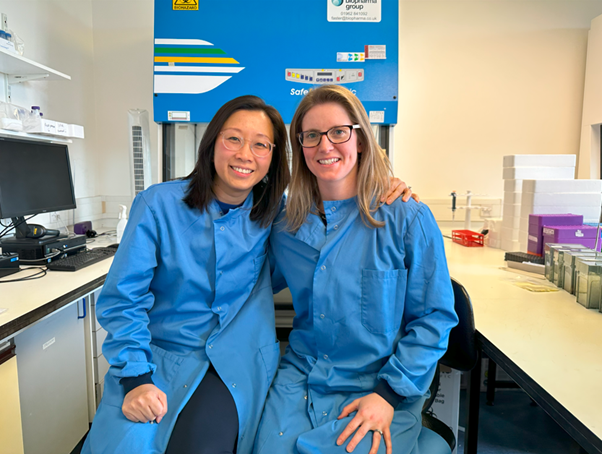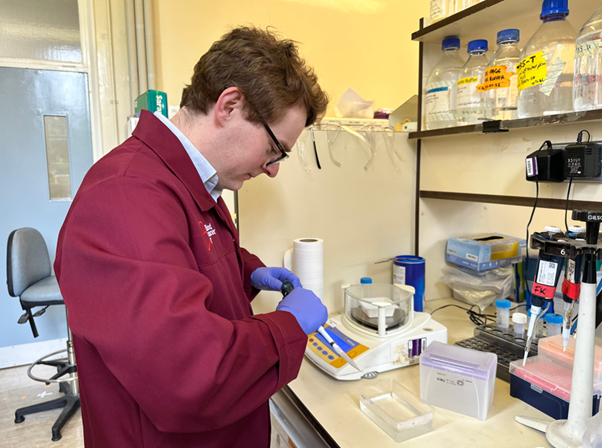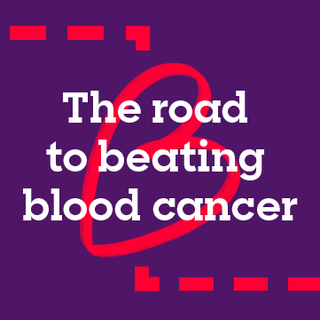New blood test to help diagnose myeloma among research boost to Birmingham
The Midlands
Blood Cancer UK are marking Myeloma Awareness Week, which runs from the 17th June, by announcing £1.3m of new funding to new myeloma research projects!
Over half of this money is being awarded to research at the University of Birmingham. It includes a £310k grant to a team who are developing a new blood test to help diagnose the disease.
In the UK around 5,900 people are diagnosed with myeloma each year. It’s the disease that insurance leader, now chair of trustees at Blood Cancer UK, Matthew Wilson has. In 2020 Matthew felt permanently exhausted but put it down to stress. He spent two years in a cycle of diagnosis and treatment, before seeking the expertise of another doctor where he received the life-changing blood cancer diagnosis that often presents challenges in diagnosis and treatment.
While myeloma can be treated, it currently has no cure. Now stable and living with his condition, Matthew set up the Matthew Wilson Multiple Myeloma Fund, which is funding four projects to transform outcomes for people with the disease.
A small percentage of people with myeloma do not produce sufficient amounts of a specific protein found in the blood and used to monitor their disease. This is often referred to as non-measurable myeloma. In the new £310k project, Dr Tracey Chan, Dr Jen Heaney and their team at the University of Birmingham are developing a new technique to help diagnose and monitor people with non-measurable myeloma.

Dr Tracey Chan and Dr Jen Heaney in their labs at the University of Birmingham
The technique takes blood samples from someone with myeloma and separates proteins found in the blood based on their electrical charge. It detects specific proteins that would not be visible with standard blood tests.
The team will be testing their new technique on a large group of people with the disease and will also conduct group conversations with people with non-measurable myeloma to understand their opinions of using this type of test as an alternative.
These blood tests would be relatively low cost and may also be done at a patient's local GP surgery.
- Dr Tracey Chan, University of Birmingham
Speaking about the project, Dr Jen Heaney from the University of Birmingham said:
“People with non-measurable myeloma regularly undergo more invasive procedures such as bone marrow biopsies and whole-body scans to diagnose and monitor the disease. These types of procedures are much more time-consuming and can cause a lot of stress and discomfort. Our research will test a new less invasive technique and understand whether it could be used as an alternative.”
Dr Tracey Chan, from the University of Birmingham, said:
“These blood tests would be relatively low cost and may also be done at a patient's local GP surgery, which are usually closer to home, so when undergoing treatment people with this form of blood cancer wouldn’t have to regularly make the journey to hospital for check-ups.”
The project is being funded through the Matthew Wilson Multiple Myeloma Fund, which is also backing Dr Aidan Haslam in a clinical research fellowship.

Aidan Haslam conducting research in the lab
Dr Aidan Haslam is an early career clinician and researcher. Having worked in the NHS for 5 years, he specialises in the care of those with blood cancer. Everyone who has myeloma had a pre-cursor condition called Monoclonal Gammopathy of Undetermined Significance (MGUS). MGUS doesn’t cause any symptoms and most people with MGUS never go on to develop cancer. In the £320k project, Dr Haslam is working to identify who with MGUS are at the highest risk of developing myeloma.
I feel very lucky that I get to continue supporting patients with blood cancer, through research.
- Dr Haslam, Matthew Wilson Multiple Myeloma Future Leader
Dr Haslam said:
“I’m delighted to become a Matthew Wilson Multiple Myeloma Future Leader and carry out research into myeloma – the second most common form of blood cancer. Meeting patients with blood cancer and their families is what inspires me as a doctor. It’s been a privilege to support them through their treatments and I feel very lucky that I get to continue supporting patients with blood cancer, through research. Ultimately, I hope we can diagnose patients with myeloma earlier and maybe even prevent it from developing in the first place.”
31% of people with blood cancer have to visit their GP three or more times before being diagnosed.
- Dr Rubina Ahmed, from Blood Cancer UK
Dr Rubina Ahmed, Director of Research, Policy and Services at Blood Cancer UK, the charity funding the projects, said:
"Blood cancer is the UK’s third biggest cancer killer, so research to understand how to better diagnose these conditions is vital. Our own research shows 31% of people with blood cancer have to visit their GP three or more times before being diagnosed. Thanks to the Matthew Wilson Multiple Myeloma Fund we’re able to make these projects at the University of Birmingham possible. With continued focus on diagnosing and preventing myeloma, we will make sure fewer people are affected by the condition.”


